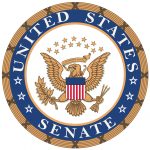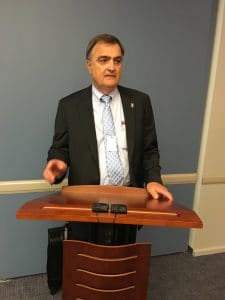 WASHINGTON – The U.S. Department of Transportation’s Federal Railroad Administration (FRA) published a final rule requiring 40 states and the District of Columbia to develop and implement highway-rail grade crossing action plans to improve public safety. In addition, the rule requires 10 states that have already developed grade crossing action plans, as required by the Rail Safety Improvement Act of 2008 (RSIA) and FRA’s implementing regulation, to update their plans and submit reports describing the actions they have taken to implement them.
WASHINGTON – The U.S. Department of Transportation’s Federal Railroad Administration (FRA) published a final rule requiring 40 states and the District of Columbia to develop and implement highway-rail grade crossing action plans to improve public safety. In addition, the rule requires 10 states that have already developed grade crossing action plans, as required by the Rail Safety Improvement Act of 2008 (RSIA) and FRA’s implementing regulation, to update their plans and submit reports describing the actions they have taken to implement them.
“Grade crossing accidents and incidents are the second-leading cause of rail-related deaths in the United States, but nearly every one of them is preventable,” said FRA Administrator Ronald L. Batory. “The action plans give states a tool to engage with federal and local partners, railroads, and rail safety advocates to identify high-risk crossings and develop strategies to save lives.”
“Safety is imperative to FHWA, especially where roads and rails meet,” said Federal Highway Administration (FHWA) Administrator Nicole R. Nason. “These action plans can help states make highway-rail grade crossings safer for the traveling public.”
The final rule responds to a Fixing America’s Surface Transportation (FAST) Act mandate requiring states to develop and implement (or update, if applicable) action plans. Each plan must identify crossings that have experienced at least one accident or incident in the previous three years, multiple accidents or incidents in the previous five years, or that are determined by the state to be at high-risk for accidents or incidents. Furthermore, each action plan must identify specific strategies for improving safety at crossings, including crossing closures or re-aligning roadways over or under railways.
Under RSIA, FRA identified 10 states as having the most highway-rail grade crossing collisions, on average, over the three-year period from 2006 through 2008. In June 2010, FRA issued a final rule requiring these states to develop action plans and submit them to FRA for approval. The states are Alabama, California, Florida, Georgia, Illinois, Indiana, Iowa, Louisiana, Ohio and Texas. The FAST Act now requires each of them to submit an updated action plan and a report to FRA describing what it did to implement its previous action plan and how it will continue to reduce crossing safety risks.
All 50 states and the District of Columbia are required to submit individual highway-rail grade crossing action plans to FRA for review and approval no later than 14 months after the final rule’s publication date of December 14, 2020. FRA will provide technical assistance to help them develop (or update) their action plans. The states may also use federal funds allocated through FHWA’s Railway-Highway Crossing (Section 130) Program to develop and update their action plans.
Further information on the final rule for State Highway-Rail Grade Crossing Action Plans is published in the Federal Register here.
Tag: FAST Act
 WASHINGTON, D.C. – The Senate Committee on Appropriations approved the FY2018 Transportation, Housing and Urban Development, and Related Agencies Appropriations Act, July 27, which prioritizes funding for critical transportation projects, community development initiatives and core housing programs that serve the nation’s most vulnerable individuals.
WASHINGTON, D.C. – The Senate Committee on Appropriations approved the FY2018 Transportation, Housing and Urban Development, and Related Agencies Appropriations Act, July 27, which prioritizes funding for critical transportation projects, community development initiatives and core housing programs that serve the nation’s most vulnerable individuals.
The bill provides $60.058 billion, $2.407 billion above FY2017 enacted levels, to fund the U.S. Department of Transportation, U.S. Department of Housing and Urban Development and related agencies. The bill was passed unanimously, 31-0.
The committee-passed bill places a priority on programs to improve the safety, reliability and efficiency of the nation’s transportation system, including increased funding for the TIGER grant program. The measure also emphasizes rental assistance and community development, providing funding for the Community Development Block Grant, HOME, and other programs.
“Our economy and the well-being of the American people benefit from responsible investments in American infrastructure and community development. This bill continues federal funding to support these objectives,” said Appropriations Committee Chairman Thad Cochran (R-Miss.). “Senators Collins and Reed have worked to balance national priorities within budget constraints. I am pleased to recommend this bill to the Senate.”
“This bipartisan bill is the product of considerable negotiation and compromise, and makes the necessary investments in our nation’s infrastructure, helps to meet the housing needs of the most vulnerable among us and provides funding for economic development projects that create jobs in our communities,” said U.S. Senator Susan Collins (R-Maine), chairman of the Senate Transportation, Housing and Urban Development Appropriations Subcommittee. “Our bill strikes the right balance between thoughtful investment and fiscal restraint, thereby setting the stage for future economic growth.”
Transportation Funding Highlights:
Transportation – $19.47 billion in discretionary appropriations for the U.S. Department of Transportation for fiscal year 2018. This is $978 million above the FY2017 enacted level.
• TIGER Grants – $550 million, $50 million above the FY2017 enacted level, for TIGER grants (also known as National Infrastructure Investments).
• Highways – $45 billion from the Highway Trust Fund to be spent on the Federal-aid Highways Program, consistent with the FAST Act. The bill also continues to allow State Departments of Transportation to repurpose old, unused earmarks for important infrastructure projects.
• Aviation – $16.97 billion in total budgetary resources for the Federal Aviation Administration (FAA), $563 million above the FY2017 enacted level. This will provide full funding for all air traffic control personnel, including more than 14,000 air traffic controllers, and more than 25,000 engineers, maintenance technicians, safety inspectors and operational support personnel.
The bill also provides $1.1 billion for the FAA Next Generation Air Transportation Systems (NextGen), and fully funds the Contract Towers program to help ease future congestion and help reduce delays for travelers in U.S. airspace. In addition, the bill rejects the proposed privatization of the air traffic control system and provides greater flexibilities for airports to make much-needed capacity improvements.
• Rail – $1.974 billion for the Federal Railroad Administration (FRA), $122 million above the FY2017 enacted level. This includes $1.6 billion for Amtrak for the Northeast Corridor and National Network, continuing service for all current routes. The bill also provides $250.1 million for FRA safety and operations, as well as research and development activities.
The bill also provides $92.5 million for the Consolidated Rail Infrastructure and Safety Improvement grants program, of which $35.5 million is for initiation or restoration of passenger rail, $26 million for Federal-State Partnership for State of Good Repair grants, and $5 million for Restoration and Enhancement grants.
• Transit – $12.129 billion for the Federal Transit Administration (FTA), $285 million below the FY2017 enacted level. Transit formula grants total $9.733 billion, consistent with the FAST Act. The bill provides a total of $2.133 billion for Capital Investment Grants (“New Starts”), fully funding all current “Full Funding Grant Agreement” (FFGA) transit projects, which is $280 million below the FY2017 enacted level.
• Maritime – $577.6 million for the Maritime Administration, $55 million above the FY2017 enacted level, to increase the productivity, efficiency and safety of the nation’s ports and intermodal water and land transportation. The Maritime Security Program is funded at $300 million.
The bill includes $32 million for State Maritime Academies (SMAs), and an additional $50 million for the National Security Multi-Mission Vessel. This training ship is essential for the SMAs to continue to provide the nation with a strong merchant marine workforce.
• Safety – The legislation contains funding for the various transportation safety programs and agencies within the U.S. Department of Transportation. This includes $908.6 million in total budgetary resources for the National Highway Traffic Safety Administration and $744.8 million for the Federal Motor Carrier Safety Administration. Of this amount, $68 million is to complete the modernization of border facilities to improve inspections along the Southern border. The bill also includes $272 million for the Pipeline and Hazardous Materials Safety Administration to help address safety concerns related to recent pipeline and crude oil by rail accidents.
Click here to read the full press release from the U.S. Senate Committee on Appropriations.
Proposed rule: “Competitive Passenger Rail Service Pilot Program”
 The Federal Railroad Administration (FRA) published a Notice of Proposed Rulemaking (NPRM) in the Federal Register August 22. This proposed rulemaking from the FRA is a direct result of Section 11307 of the FAST Act which requires FRA to implement a pilot program for competitive selection of petitioners other than Amtrak to operate up to three long-distance routes currently operated by Amtrak. The final rule will establish the procedures for interested parties to submit bids and the information that petitioners must submit to FRA. It will also establish the procedures for the Secretary to evaluate bids, and select and notify selected petitioners, should there be any.
The Federal Railroad Administration (FRA) published a Notice of Proposed Rulemaking (NPRM) in the Federal Register August 22. This proposed rulemaking from the FRA is a direct result of Section 11307 of the FAST Act which requires FRA to implement a pilot program for competitive selection of petitioners other than Amtrak to operate up to three long-distance routes currently operated by Amtrak. The final rule will establish the procedures for interested parties to submit bids and the information that petitioners must submit to FRA. It will also establish the procedures for the Secretary to evaluate bids, and select and notify selected petitioners, should there be any.
SMART TD, TTD and all of rail labor opposed this concept and other privatization mandates as the bill was going through the legislative process and fought to remove it or include conditions that would protect workers and create a level playing field if it ever went into effect. In the end, while the pilot provision stayed in the final bill, a number of conditions were attached to it at our request and it was limited to three long-distance routes. Given the political realities we face on the Hill and the opposition to Amtrak that exists, this was not an easy task.
TTD submits comments on proposed rule
Yesterday, September 6, the Transportation Trades Department (TTD) of the AFL-CIO commented on the proposed rule published by the FRA. Click here to read TTD’s comments.
National Legislative Director John Risch on TTD’s comments:
“The comments filed by TTD urge FRA to ensure that labor, service and Buy America rules that attach to this program are fully implemented. Specifically, TTD’s comments call on FRA to ensure that so-called 4R rail employee protections cover workers impacted by this program. As TTD notes in their comments, we think the law requires this result, but we need to make sure the FRA implements this in the right way. I should note that Rich Edelman, on behalf of the BMWE (which was not included in TTD’s comments since they are not members) also filed comments. Edelman, who has a strong background in this area of the law, goes into more detail on the legal background on the protections which should be helpful. It is important to note that both TTD and Edelman’s comments are on the same page. (Click here to read Edelman’s comments.) They demand 4R act protections and our comments have a whole section that talks about why they are legally needed to be applied and specifically ask that the proposed regulations be amended to require any winning bidder be responsible for those protections. We also are asking FRA to issue guidance to adopt them to this situation.
“TTD’s comments also urge FRA to adopt hiring preferences and procedures for Amtrak employees and to ensure that any new entity is covered by rail laws just like Amtrak is today.
“We all need to keep this in perspective. Amtrak receives preferential pricing from the Class 1’s to operate over their track, something the Class 1’s have for years decried as inadequate. A new entrant will not likely receive nearly as good an operating rate as Amtrak currently does. If there is a winning competitive bidder on any of these three routes they will only receive 90 percent of the funding that Amtrak currently receives to provide the service making the bidding process even harder.”
SMART TD Testifies before FRA
Today, September 7, the FRA held a public hearing on the proposed rule. SMART Transportation Division National Legislative Director John Risch was at the hearing and testified on behalf of SMART TD. Click here to read his comments.

U.S. public transportation authorities are using taxpayers’ dollars to employ Americans. Well, sort of — there’s a lot of room for improvement. Thanks to weak laws and procurement rules, taxpayer dollars all too often reward low-road companies that pay poor wages and routinely game our domestic content rules to manufacture just the minimum here in America.
That’s why transportation unions have long supported policies that raise domestic content standards for transit and rail purchases made with federal funds — the same kind of laws found in the recently passed Fixing America’s Surface Transportation (FAST) Act. In addition to being the first long-term, bipartisan surface transportation bill in a decade, the FAST Act raises Buy America standards for transit vehicles from a 60 percent minimum to a 70 percent minimum domestic content.
This is a great next step in our effort to beef up transportation manufacturing jobs, but we aren’t stopping now: the goal must be 100% domestic content for publicly funded transit and rail equipment orders. Unfortunately, changes to procurement laws alone aren’t enough to get us there. In fact, a new report by economist Robert Pollin and the Political Economy Research Institute (PERI) shows more can and needs to be done to ensure that investments in our nation’s transportation infrastructure help sustain domestic manufacturing and the millions of jobs the sector supports. The report, titled Strengthening U.S. Manufacturing Through Public Procurement Policies, focuses on railcar procurements, but its lessons can be applied to the broader Buy America program.
The report finds that:
- 60 is the new 40. Under law, 60 percent of component production and 100 percent of final assembly of railcar manufacturing are supposed to happen in the U.S. However, as the authors show, for a variety of reasons, these standards amount to an overall requirement of only 40 percent domestic production.
- Monitoring and enforcement standards are a weak link. Because few local transit agencies have adequate capacity to conduct audits in-house and public interest groups face major obstacles in obtaining relevant compliance information, the monitoring and enforcement of domestic content requirements leave much to be desired.
- Too many waivers are still granted. Available evidence suggests that a significant number of domestic content waivers are being granted to contractors bidding on transportation procurement projects covered under Buy America. The good news? Under the Obama Administration, the wavier process has improved significantly. But there’s more work that needs to be done. The Department of Transportation needs to keep systematic records on waiver applications and decisions and to establish consistently high thresholds for granting waivers.
As the authors of the study point out, we must pair stronger laws with straightforward, effective measures that encourage public transportation agencies to consider the impact of their purchases here at home. Some of the plans outlined in the report — including changes to Request for Proposal (RFP) procedures — are the same kind of forward-thinking measures being pushed by the Jobs to Move America Coalition, of which TTD has been a member since 2013. They include incentivizing companies that bid on publicly-funded transportation equipment orders to describe the number and quality of jobs that would be created from a contract, and encouraging local transit authorities to select bids based on best value instead of just the lowest price. This new approach rewards employers that train their workers and make a genuine effort to hire people from disadvantaged populations including, for example, veterans and single mothers.
These kinds of smart procurement strategies act as a win-win for all parties involved: public transportation dollars help create good transportation manufacturing jobs here at home; transit agencies purchase high-quality, American-made components; and high-road manufacturers are rewarded for lifting labor standards and keeping buses and trains made in the USA.
Read the full report here.

On December 3, 2015, Congress passed H.R. 22, the Fixing America’s Surface Transportation Act (FAST ACT) by overwhelming bipartisan votes of 83 to 16 and 359 to 65 in the Senate and House respectively. The legislation is the first long-term surface transportation reauthorization in a decade and provides funding and policy changes for our nation’s highways, mass transit and rail systems. This landmark legislation includes a number of SMART TD policy priorities, many of which are outlined below.
“I’m very pleased with the legislation overall compared to some of the original proposals. The legislation was modified in both houses and in the conference committee to correct many of the harmful issues facing our membership,” SMART TD President John Previsich said.
“Our National Legislative Director John Risch and his team, working with other unions and allies did a stellar job on a very complex 1300-page piece of legislation that was passed through a very complicated legislative process.

“In difficult economic and political times, an effective legislative department makes all the difference and we have one of the best in the business.”
“Considering the makeup of the Congress, overall we are pleased with the policy provisions in this legislation, and that the law covers five years of authorization,” said Risch. “However, we are disappointed that much of the funding came from non-user fees. Freight railroads alone fund their own track and infrastructure. Using general funding for highways puts railroads at a competitive disadvantage because trucks are not paying their fair share of costs for highway construction and maintenance.”
Provisions to protect transit members from assault
- Section 3022. Improved Public Transportation Safety Measures
- This much-needed section will better protect our transit members by requiring the Federal Transit Administration to promulgate regulations to protect public transportation operators from assault.
- The rulemaking will be required to consider the safety needs of drivers in different modes, including bus and light rail.
- This provision was a direct result of a joint lobbying effort by SMART TD, the AFL-CIO’s Transportation Trades Department (TTD), AFL-CIO, the Transport Workers Union (TWU) and the Amalgamated Transit Union (ATU).
ECP brake mandate is maintained
- The legislation largely protects the May 2015 Pipeline and Hazardous Materials Safety Administration (PHMSA) rule that requires the use of electronically controlled pneumatic (ECP) brakes on certain high-hazard flammable trains (HHFTs), which SMART TD strongly supports.
- While the legislation does require another study on ECP brakes, it also includes language supported by SMART TD that will ensure testing is done independently and objectively, and not by the railroads or other entities affected by the rule.
- Additionally, the legislation neither prohibits DOT from moving forward with the May 2015 rule while the study is in progress, nor does it require DOT to issue a new rule dependent on the study’s findings.
- The original Senate Commerce Committee language would have repealed the ECP rule and replaced it with a railroad-dominated study.
Inward-facing cameras cannot be used to retaliate against employees.
- Working with Senator Richard Blumenthal (D – Conn.), SMART TD secured a provision stating that any in-cab audio or image recording obtained by a railroad carrier under this section may not be used to retaliate against an employee. Rail Subcommittee Chairman Jeff Denham (R – Calif.) reinforced this provision by specifically mentioning it in a House floor speech.
- We are pleased the final bill removed a requirement for efficiency testing.
Removed harmful privatization language for transit projects
- Working with TTD and other transit unions (TWU and ATU), SMART TD helped strip a harmful privatization provision from the legislation. The provision would have been an unprecedented giveaway to the private sector by allowing certain public-private partnerships to move to the front of the line for grant awards simply because the project included private money, with no minimum threshold.
- This provision – if not changed – could have resulted in lost jobs, lower wages and diminished passenger rail and transit service.
Biased hair testing methods rejected
- SMART TD has strongly opposed the unfair and biased use of hair testing for drug tests.
- SMART TD strongly opposed previous versions of this legislation that would have allowed companies to immediately begin testing an employee’s hair for drugs.
- The final legislation would only allow companies to do so after experts at the Department of Health and Human Services have set guidelines for such testing.
Tank car safety standards
- The legislation makes substantial improvements in tank car standards by requiring that all new tank cars are equipped with one-half inch thermal blankets.
- All existing DOT-111 tank cars transporting flammable liquids are required to be upgraded to retrofit standards regardless of product shipped.
Alerters
- The legislation requires DOT to promulgate a rule requiring working alerters in the controlling locomotive of each commuter and intercity passenger train.
Signal Protection
- The legislation requires DOT to initiate a rulemaking for redundant signal protection for Maintenance of Way (MOW) workers.
PTC Grants
- The legislation provides $199 million to finance a competitive grant program for PTC implementation on commuter railroads.
Funding: Amtrak and Transit
- Transit programs will receive a 9 percent funding increase in Fiscal year 2016 over FY 2015 levels and 2 percent increases each year through 2020.
- Amtrak is funded through the appropriations process; however, this legislation increases authorized FY 2016 funding levels for Amtrak by $60 million.
Washington — Edward Wytkind, president of the Transportation Trades Department, AFL-CIO (TTD), issued this statement in response to a House-Senate deal on a long overdue surface transportation reauthorization bill:

“The Fixing America’s Surface Transportation (FAST) Act is a bipartisan, long-term funding bill for our nation’s transit systems, highways, bridges and passenger rail networks that we are proud to support. The deal reached by House and Senate negotiators breaks the cycle of flat-line funding and short-term extensions that has strangled our economy and stunted job creation. We applaud Congressional leaders for their work on this important legislation and particularly want to thank Chairman Shuster, Ranking Member DeFazio, Chairman Inhofe and Ranking Member Boxer for their pursuit of a long-term bill.
“TTD and its member unions have never relented in our multi-year campaign to convince lawmakers to forge a bipartisan compromise on a long-term highway-transit bill that prioritizes funding growth and job creation. We applaud lawmakers for crafting a bill that makes great strides in reversing many years of neglect.
“The FAST Act strikes the right balance on many of the important policy issues that were considered in this legislation. The bill includes measures to address bus driver assaults, handles transit public-private partnerships in a more responsible manner, improves Buy America rules and makes improvements to rail safety and the transport of hazardous materials. Conferees wisely chose not to use this bill to attack the bargaining rights of port workers, adopted provisions that preserve the role of sound science in determining the appropriateness of hair specimen drug testing and rejected an attempt to force contracting out of public-sector engineering work.
“We are pleased that the FAST Act contains a multi-year Amtrak reauthorization that will help sustain America’s national passenger railroad, protect thousands of middle-class jobs and allow Amtrak and its employees to meet the soaring demand for rail transportation. Finally, the bill includes the reauthorization of the Export-Import Bank, which will help American manufacturers and their employees compete with foreign companies and support good middle-class jobs in this country.
“We urge both chambers to pass the FAST Act and send it to the President’s Desk for his signature.”


